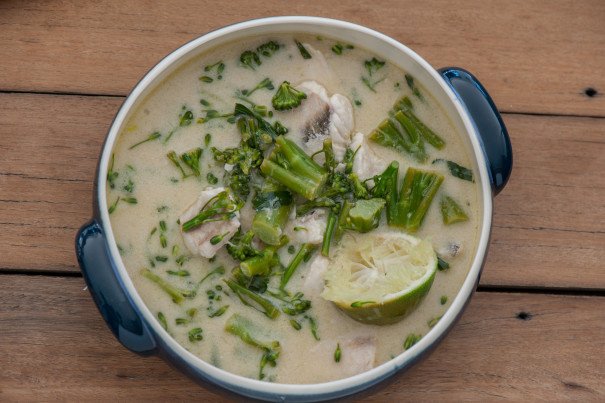
Variations on a Fish Soup Theme

Variations on a Fish Soup Theme
Fish Soup in Northern Greece
During my second year at Edinburgh uni, 19 and desperate to grab vast chunks of the world, I spent my nights Googling endless variations of “how to travel the world for free.”
Through a European temp agency, I scored a job as a waitress/bartender at a hotel in a small beach town in northern Greece.
Pay wasn’t great. Many of my compatriots weren’t too keen on working for the equivalent of a Mars bar an hour, even with room and board included, even with the Mediterranean a ten-minute walk down a hill from the staff “accommodation,” a half-built house surrounded by a yard filled with discarded bricks and barbed wire.
I didn’t care.
I was in Greece. The girl who couldn’t answer a phone or look anyone in the eye a year ago was living in Greece, on an adventure, working with clever Slovakian and Czech girls, handsome Albanians, peacocking Macedonian boys, and—my new best friend—a silicon-enhanced Colombian rollerskating champion, Daniela.
We did everything together, Daniela and I, until she found a rich Greek boyfriend named Nico, quit working at the hotel, and moved into a flat up the road.
Catching up on the beach a couple of weeks after she’d left work, I moaned to Daniela about the boys getting the best shifts, the cheap work shoes I had to glue back together every night, the fighting between staff. “I want to quit,” I said.
“Hey, if you’re serious,” said Daniela, “I can get you a job at Cheers! It’s Nico’s cousin’s bar. Then you’ll have your days free and we can run around the coast eating at different tavernas each day. Nico can pay.” She laughed.
“Sold,” I said. “God, you’re so lucky Daniela. Did he get you that dress, too?”
“He did, but I’m not lucky. The more a man buys for me, the more he thinks he’s buying me. Trust me, keep going with your education. That way you can buy all your own things, and no one can believe they have power or control over you.”
Two days later, I was pouring drinks at Cheers! It had been decided that I’d stay at the family home of Yannis, one of the co-owners.
He explained, “At the house it’s me, my mum, and my grandma. They don’t speak English, and you can barely string ten words of Greek together, but they’re kind and you seem kind. They’re looking forward to having you.”
Late next morning, having slept for the first time at Yannis’s house and feeling shy, I tiptoed downstairs to a huge spread, and practically fell back from the warmth of the “kalimeras”—“good mornings”—from the mum and grandma.
I watched the family use their forks and spoons to take the whole fish from their soup bowls, then deftly pull the meat from the bones, tossing the best bits back in the broth.
I tried to copy, and instead spun fish from my plate all over the lacy white tablecloth. Everyone laughed.
“Having trouble?” asked Yannis. “Here, let me help you.”
“Efharisto”—“Thank you”—I whispered, cringing.
Tucking into my newly-prepped bowl of soup was one of the best food experiences I’ve ever had.
“What is this called?” I asked Yannis.
He translated for his mum and grandma and said, “It’s just fish, Ailsa. It’s just…fish soup. You’ve never had such a thing before?”
“At home, sure, but it doesn’t taste like this. We make it with milk, and smoked fish, and black pepper.”
“Sounds good.”
“It is.” Both soups taste of care, and love, and family.
Later that day, I called my mum from the village payphone. “I’m ready to come home,” I said. “I love you. I’m lonely. I’m ready to come home.”